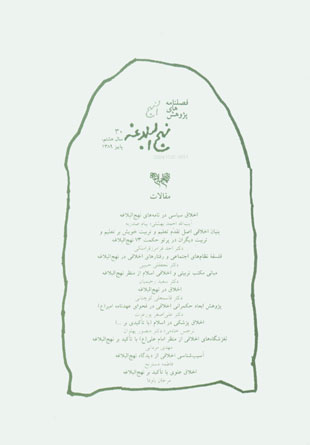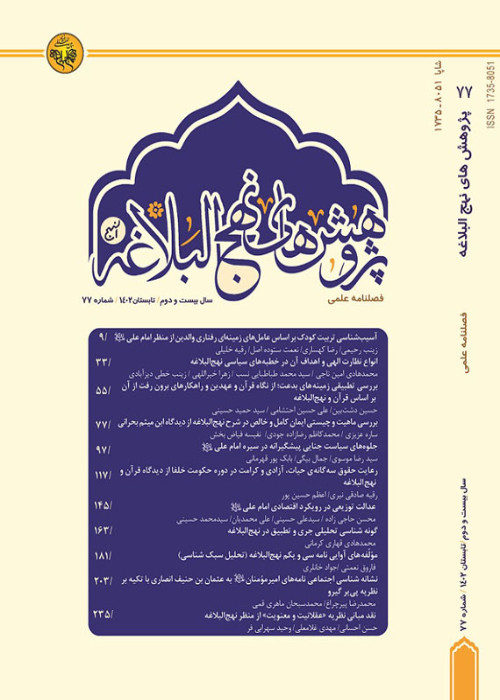فهرست مطالب

نشریه پژوهش های نهج البلاغه
سال نهم شماره 3 (پیاپی 30، پاییز 1389)
- 216 صفحه، بهای روی جلد: 30,000ريال
- تاریخ انتشار: 1389/10/20
- تعداد عناوین: 11
- سرمقاله
- مقالات
-
بنیان اخلاقی اصل تقدم تعلیم و تربیت خویش بر تعلیم و تربیت دیگران در پرتو حکمت 73 نهج البلاغهصفحه 41
-
صفحه 90
-
صفحه 189
-
Page 11The present article deals with individual and managerial ethics in the letters of Nahj al- Balagha. The first part concerns a proper understanding of oneself, proper view of responsibility, freedom, asceticism, assuming virtues and avoiding vices. The second part tackles such issues as the proper understanding of responsibility, citizenship rights, rights of opponents, taking care of governors and officials, constraining offenders, justice- orientedness, right- orientedness, religious democracy, morality in the battle field,fulfilling promises, spreading information and managerial ethics.
-
Ethical Foundation of the Principle of Priority of One's Own Education and Purification to Other's (in the light of maxim 73 of Nahj al-Balagha)Page 41Maxim 73 of Nahj al-Balagha deals with one of the significant qualifications of Imam in its general sense. i.e. the priority of educating oneself to educating others. Sticking to this principle requires guiding others by our deeds and practices before teaching them by our words. One who gains success in his education, is appreciated more than one who undertakes mere teaching of other people. The denotation of this maxim may be analyzed in different approaches such as political, managerial, educational, and ethicalones. The ethical analysis indicates that its foundation lies in the priority of interpersonal communication behavior to extra -personal one. The contents of this maxim in its ethical approach indicates the mechanism of efficient teaching of ethics. The condition of efficiency of ethical education is one s spiritual purification so that an individual can teach others through his good manners.
-
Page 69The moral school of Islam found the position of derivation, deduction and compilation of its teachings even higher than the two fields of jurisprudence and theology in the first century thanks to the enlightening verses of the Quran, the moral conduct of the holy prophet and his ethical traditions, and in particular the large number of ethical traditions, maxims, and sermons of Imam Ali and his moral conduct in the whole span of 25 yearsafter the Prophet. Relying on the ethical traditions of Nahj al-Balagha, this article is an attempt to present a coherent picture of his all- out enlightenment in the field of ethics. The issues discussed in the article are as follows: definition of ethical concepts, modification and correction of ethical concepts, preference of more significant ethical items to significant ones, and devising demonstrative ethics.
-
Page 90Knowing different temperaments and distinguishing praiseworthy qualities from blameworthy ones, assuming good moral qualities and eliminating vices are the peak of knowledge according to Imam Ali. Commendable moral qualities in his view are the best companion for human being. One of these qualities is associating with the next of kin which is considered as a branch of the virtue of probity. Regard of kinship requires that man shares his material or worldly bounties with his relatives. Overlooking other people s faults important social systems mainly relevant to government and governor whilestating the philosophy and arguments behind them. So if individuals including people and officials ponder the rationality behind laws and instructions, they would have better performance. b) Important ethical questions and issues as well as the explanation of the moral behaviors of human being play a big role in the formation of political identity. Referring to the Sermon of Hammam which explains the moral behaviors of a Muslim, and linking it to sermon 198 which explains the behavioral qualities of the hypocrite, thesecond part of the article deals with the role of the moral behaviors of the faithful and the hypocrite in forming their political identity.
-
Page 115As a source of spiritual wisdom and a matter of pride for the Shiite school, the covenant of Imam Ali is one of the primary Islamic references towards derivation of obligations and principles of governance ethics and ethical governance. Special focus of this covenant on consistency of words and deeds, and preparation for sacrifice towards serving the society offers a coherent framework towards understanding the obligations of managerialethics in Islam to researchers in this field. It also reveals the significance and position of administration in Islam.
-
Page 133
Dealing with the life and mind of human being, medicine has a high and popular position in every culture. Looking at medicine as a holy profession ذsince long ago, people have expected those holding this occupation to assume moral virtues and remove vices in order to safeguard the sanctity being a branch of advice (nasiha) is considered the noblest among generous deeds, its reward being innumerable. Keeping patient while facing evils and in the way of Allah is tantamount to the head for one s faith. Patience is a courageous act or rather bravery itself. Being faithful to trusts is another moralquality commended in traditions. Being confident to other people s secrets is another moral quality bringing success for its holders. Contentment is an inexhaustible treasury. Asceticism is abandoning wealth, position, and other worldly pleasures. Asceticism offers man an insight to see the vices of this world. Piety is avoiding divine punishment as a result of being obedient to God. There is nothing dearer than piety. Forgiving one who has done injustice, thanking God, accusing one s own soul, and being afraid of one s own deeds are the signs of the pious. Avoiding what God has forbidden, asking for beneficial knowledge, showing forbearance in troubles, honesty, moderation in dress, and modesty in walking are the signs of the virtuous. Self -esteem isa quality which prevents man from defeat. Real majesty lies with Allah, His Messenger, and the believers.
-
Page 147The voluntary behaviors of human being –forming the substance of morality- are subject to change under the influence of various factors and cause, thus being manifested in certain moral virtues or vices. Some behaviors emerge under the influence of internal and mental factors of human being as some others emerge out of external and environmental factors. Therefore, an ethics-oriented man needs to know the conditions putting him in danger of being trapped in moral slippery slopes if he is supposed to have a propermanagement of his behaviors and safeguard them from individual and social injuries. Having a large variety based on the various stages of the life and development of human being, these slippery slopes would cover such aspects as individual, social, economic and political ones. These slopes have a high frequency in the words of Imam Ali particularly in Nahj al-Balagha
-
Page 170Taking the views and performance of believers into consideration, the words of Imam Ali on knowing moral injuries in a religious society suggest the high degree of the vulnerability of the society to the factors which consider the presence of morality in different foundations of ones individual and social life as inefficient. Thus a large number of social deviations and injuries arise out of non- observance of morality which has a wide domain of influence. Breach of promise, narrow mindedness, treason, injustice,quick temper, flattery, self forgetfulness, disobedience to law, ignorance, and slavish imitation are considered the worst moral injuries.
-
Page 189The present article is a research on the morality of Imam Ali with a special focus on Nahj al-Balagha. Undoubtedly, knowledge of the whole collection of religious teachings inspires a sense of moderation and enlightenment towards social life. The whole teachings in this field suggest that Imam Ali as the Commander of the Faithful behaved in the best way towards members of his family and individuals in the society. Imam Ali enjoined obedienceand kindness towards parents, and took good care of his wife helping her in household affairs. He also recommended good bringing up and education of children, and establishing emotional and affectionate relations with them, while himself sticking to these principles in his social life. He used to respect his relatives being affectionate to them and observing their rights. He was sociable, hospitable, and good tempered towards members of society. Imam Ali was good mannered towards neighbors, meticulous in making friends, and satisfying their rights. He was kind to the down- troddenclasses of the society, the orphans and the poor satisfying their rights too. Observing precautions in behaving towards unbelievers and the People of the Book, he avoided any kind of mistreatment so that some of his opponents were attracted to him due to his good manners.


